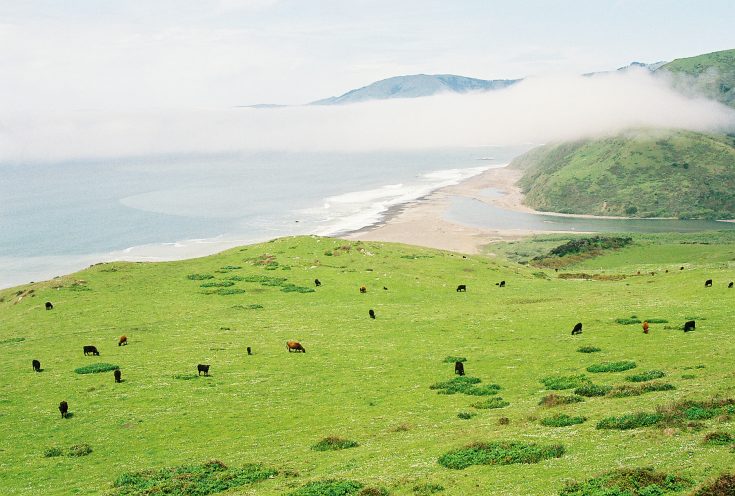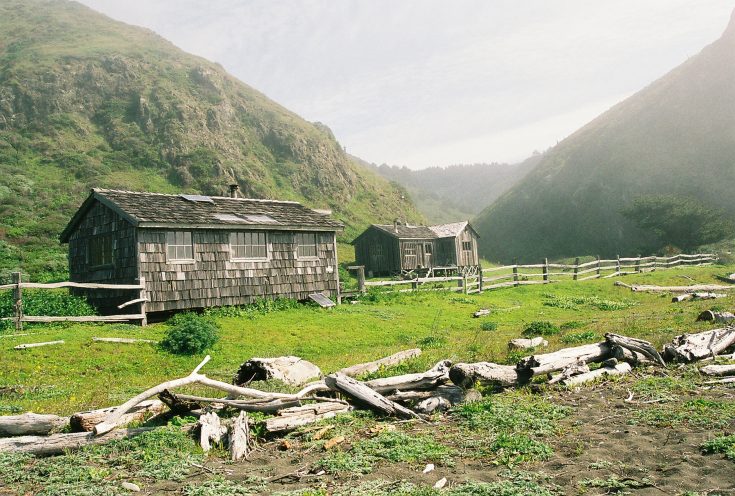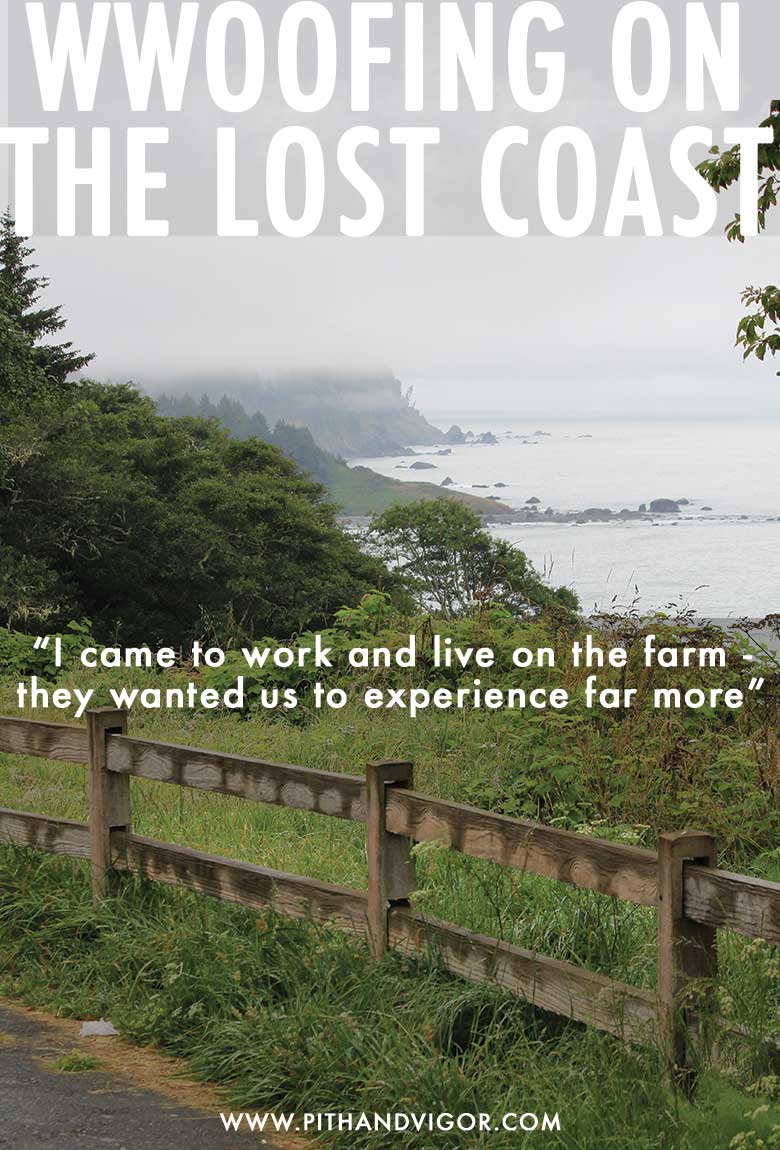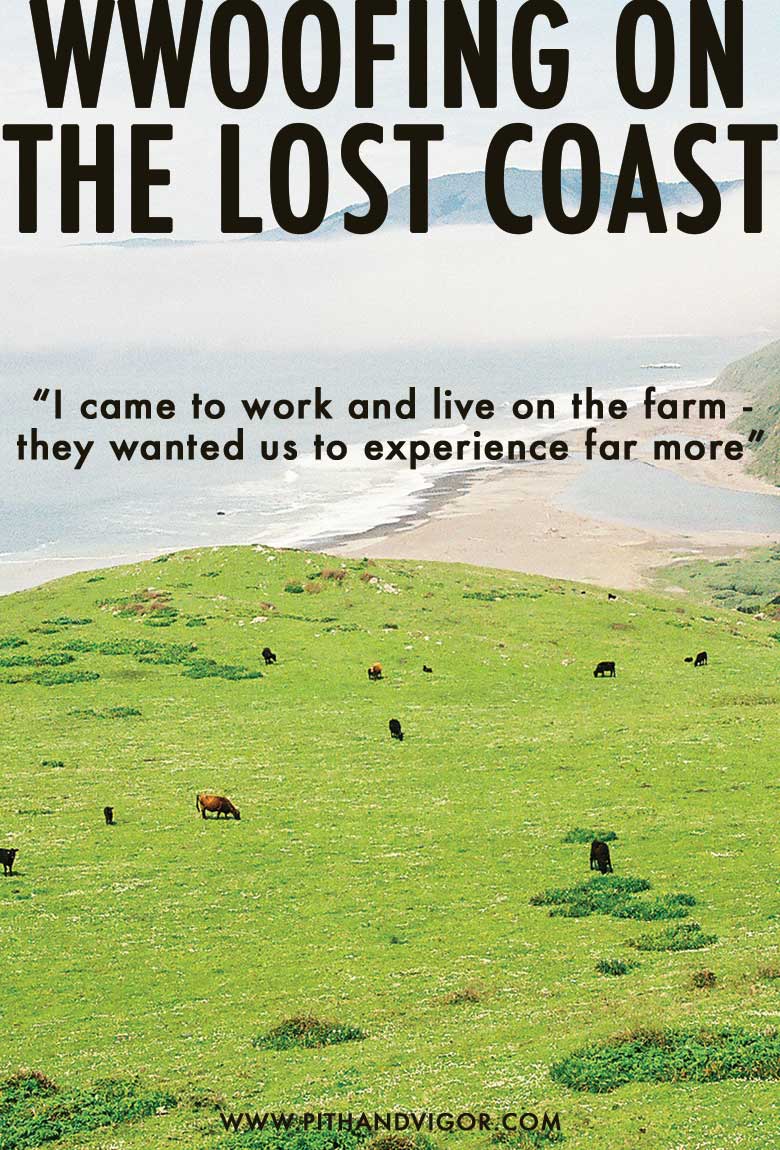With the sun setting over the Pacific just beyond the mighty outcroppings of rock and groves of fir and redwood, we welcomed the adrenaline rush brought on by navigating the wild switchbacks on the road descending into Petrolia, California.
Petrolia (pop. 400) is home to a general store and a church. It is situated in the Mattole River Valley in a vast and isolated wilderness area known as the Lost Coast, adjacent to the King Range Mountains along the largest undeveloped stretch of coastline in the continental United States.
The climate is Mediterranean.
It is a paradise.

Liza, Derek, Kim and I, and Derek’s faithful husky Kaya, lit out from Oakland that morning by car and took the scenic route. We arrived at our destination with enough light to glimpse the gardens and cattle on the organic farm owned and operated by Josie and John Brown. Liza, Kim and I, all in our 20s, came to work and live on the farm, and perhaps more importantly, to have an adventure.
We came to WWOOF.
I was more than ready for an experience. My older brother Dylan had just died at the age of 30, following a six-month struggle with brain cancer. I had recently dropped out of college— disillusioned, uninspired, and depressed. Liza –an outdoorsy blonde beauty who worked at the general store just down the street from my home in the small central Massachusetts town of Harvard—and I, had recently become friends. Liza and I worked on a farm near Santa Cruz for a week in what we deemed a “WWOOFiing” misadventure, except for the fact that we met Kim and fellow WWOOFer— a bohemian southern Californian girl with piercing blue eyes —we collectively decided we were all in need of an experience. Kim had a lead on a farm in Petrolia.
We were greeted with a smile from Josie, and right behind her, dressed in flannel shirt and jeans, John, his kind face framed by a white beard and hair and a cowboy hat. Josie and John escorted us to our quarters— an apartment above a hay barn where we would fix our meals and sleep at night during our wwoofing tenure. We met our roommate-to-be, Arrow. Sporting long blond hair and a tie-dye shirt, Arrow was a native son of Petrolia who worked at the Lost Coast Camp, also owned and operated by the Browns.
After introductions, we crashed, our thoughts spinning into dreams with the possibilities of tomorrow.
In the morning, after a breakfast of yogurt, granola and mugs of “cowboy coffee” –finely ground coffee beans mixed in boiling water and left to settle just long enough to drink –we met up with John. Rather than put us to work straight away, he drove us in his old blue pick-up to a neighbor who specializes in repairing bicycles. After equipping us with mountain bikes, John urged us to explore the town and head out to the ocean. From this initial act, we gathered our first notion of what would prove to be the philosophy of Josie and John.
They didn’t put us to work at first light and drive to get their money’s worth. With five children of their own and one grandchild, and a natural attitude that inspired adventure, they wanted to ensure that we did more than simply work. They wanted us to experience something far more.
And that we did.

We pedaled past farms and fields in bright sunshine to the shore, where we skipped over rock and sand with the wind howling off the sea. We established a new garden and planted potatoes, squash, pumpkins and corn, then uncoiled and laid the black irrigation hoses to nurture the freshly seeded ground. We liberated a small overgrown orchard. And plunged twice-a-day in the cool Mattole River to wash away the dirt and sweat.
On one occasion, Josie sent us to help prepare breakfast at the local Farmer’s Market. On another occasion, she sent us ahead to a dinner party after we had prepared some food to take along. We knew nobody at these gatherings, and I suspect it was her way of pushing us to forge our own way into the local fellowship.
On still another occasion, the Browns arranged for Liza, Kim and I to backpack for three days along the “Lost Coast” with a group of AmeriCorps volunteers. Working in the forests and fields overlooking the ocean by day, and communing with our new acquaintances camping beneath the stars at night was beyond our wildest imaginings. On Sunday evenings at the farm, we waited for the Brown family to make their weekly pilgrimage to their home-built sauna— a fitting emblem of their unity. After their retreat from the steamy meditation chamber, we followed in their footsteps happy to partake in the ancient healing practice.
With the New England winter upon us once again, I consider it my good fortune to have WWOOFed in a special corner of the planet with great friends and a remarkable host couple.
Some months later, I learned that the Browns had recently experienced the loss of their daughter—the 29-year-old poet, Cordelia Brown—prior to our stay at their farm. I wondered what stars aligned to lead me from the comforts of a small New England town on the East Coast, to a village in the wilds of the West Coast, to a family whose loss placed us closer in spiritual kinship than I could have ever imagined.
I believe those stars shine amid the millions in the night sky, and offer a space in which to gaze, reflect and heal after a hard day’s work with the earth and seeds and water.
WHAT IS WWOOF-ING?
“Working Weekends on Organic Farms”
WWOOF began in 1971 in England when Sue Coppard, a secretary living in London, recognized the need for people like herself—who did not have the means or the opportunity—to access the countryside and support the organic movement.
Her idea started with a trial working weekend for four people at a bio-dynamic farm at Emerson College in Sussex, England. The weekend was a great success and momentum gathered quickly. Soon many more organic farmers and smallholders were willing to host people interested to work on their farms in return for food and accommodation, so-called WWOOFers. Now, the letters stand for “World Wide Opportunities on Organic Farms.” WWOOF-ing projects are available at farms and gardens across the globe and details and arrangements can be made through their website.
Story By Hilah Connelly with Patrick Connelly
IMAGES: Dave (Via Flickr CC By NC-ND 2.0 and ANTHONY DOLCE (VIA FLICKR – CC BY-NC-ND 2.0)
Share This Post:


+comments+